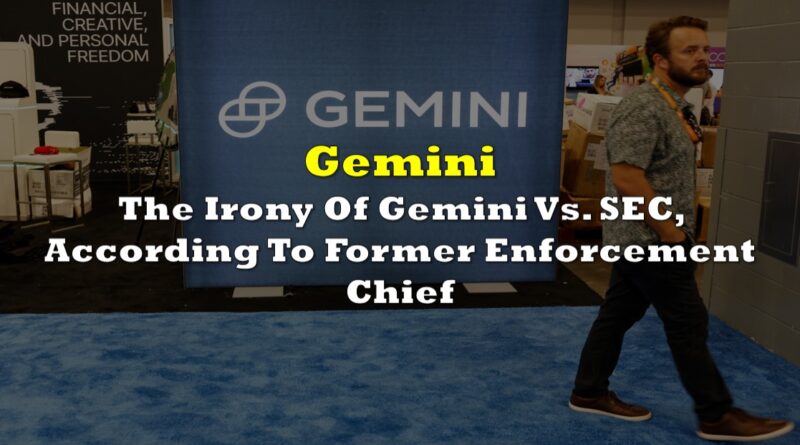The Irony Of Gemini Vs. SEC, According To Former Enforcement Chief
In a recent tweet by John Reed Stark, the former Chief of the SEC Office of Internet Enforcement, he highlighted the ongoing dispute between cryptocurrency company Gemini and the Securities and Exchange Commission (SEC). The SEC has accused Gemini of swindling $900 million from 340,000 investors through its EARN product.
However, in an unexpected twist, Gemini is now blaming the SEC for depriving investors of their right to engage in crypto-related activities, likening it to various historical analogies.
Citing Gemini co-founder Cameron Winklevoss’ tweet in which he castigated the SEC for refusing to approve the firm’s application for a Bitcoin ETF, Stark highlighted that ironically SEC’s successful civil enforcement action against Gemini could actually lead to EARN investors getting 100% of their original investment back.
“So if the SEC wins its case against Gemini, disgruntled investors stand a chance to recover some or even all of their original investment,” Stark added.
The tweet by Stark drew attention to the irony of Gemini’s stance, stating that blaming the SEC for investor losses is akin to blaming the Secret Service for not allowing a close look at the President or blaming the FDA for preventing people from drinking cyanide-laced Kool-Aid. The analogy aims to emphasize the absurdity of Gemini’s claims against the SEC.
One crucial distinction between the investors who lost money in Gemini’s EARN product and those affected by other crypto-related fallouts like FTX, Celsius, BlockFi, and Voyager, is that Gemini is financially solvent. If the SEC prevails in its case against Gemini or reaches a settlement, disgruntled investors might have a chance to recover some or all of their initial investments.
The tweet highlights that in similar cases, the SEC has established distribution plans to reimburse victims through disgorgement and penalties imposed on violators. Notably, the SEC’s victory in a case against Telegram, whom wanted to distribute its own crypto, resulted in the return of $1.2 billion to investors. Given Gemini’s financial standing, there is a possibility of a favorable outcome for EARN investors if the SEC’s case progresses, Stark concluded.
Earlier in January, the SEC charged both Gemini and Digital Currency Group’s subsidiary, Genesis Global Capital, for “the unregistered offer and sale of securities to retail investors through the Gemini EARN crypto asset lending program.”
While Gemini faces strong allegations of selling unregistered securities, the author expresses surprise that the SEC did not charge the company for failing to register as an exchange, broker-dealer, or clearing firm, as it did with other crypto platforms like Beaxy, Bittrex, Binance, and Coinbase. The omission raises questions about potential amendments to the SEC’s complaint against Gemini.
Gemini has sought to dismiss the SEC case, dismissing it as a “manufactured parking ticket” and arguing in a legal brief that the EARN agreement with customers was not a security. However, the tweet cautions against falling victim to Gemini’s posturing and urges investors to view an SEC victory as good news for the devastated EARN investors.
As the SEC’s case against Gemini unfolds, the resolution may take time. Nonetheless, should the SEC emerge victorious, it would bring some relief to EARN investors who have suffered considerable losses.
Information for this briefing was found via the sources mentioned. The author has no securities or affiliations related to this organization. Not a recommendation to buy or sell. Always do additional research and consult a professional before purchasing a security. The author holds no licenses.




